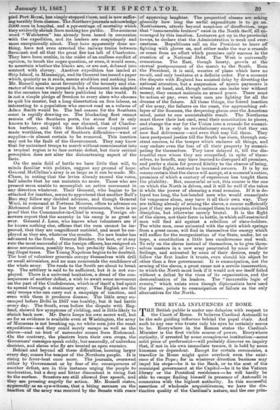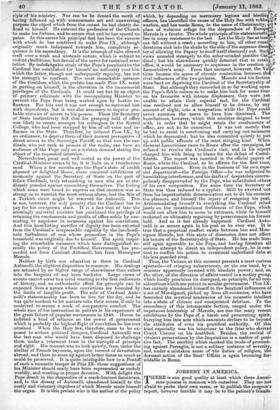UTE RIVAL INFLUENCES AT ROME.
THE British public is under one delusion with respect to the Court of Rome. It believes Cardinal Autonelli to be the sole guiding influence behind the papal chair. And such to any one who trusts only his eyes he certainly seems to be. Everywhere in the Roman states the Cardinal.. Minister is the first visible source of power. Everywhere curiosity, if arrested by some conspicuous institution—seine solid piece of preferment—will probably discover on inquiry that, if not in his own immediate tenure, it is held by some kinsman or dependent. Except for certain ceremonies, a traveller in Rome might quite overlook even the exist- ence of the Pope ; for in whatever direction business may impel his steps—be it to the Bank, or to the seat of the municipal government at the Capitol—be it to the Vatican library or the Pontifical residences — he will hardly be able to escape finding himself in presence of Antonelli in connexion with the highest authority. In this successful assertion of wholesale acquisitiveness, we have the dis- tinctive quality of the Cardinal's nature, and the one prin. ciple of his ministry. Nor can he be denied the merit of having followed up with consummate art and unswerving purpose the object which from the outset he had clearly de- fined to himself. He entered the profession of the Church to make his fortune, and to secure that end he has spared no pains. In this career his principal feat has been the success with which he has contrived to make Pius IX., although originally much indisposed towards him, completely ac- quiesce in his ascendancy. It is the triumph of calm shrewd craft over a weak and unsteady nature, which is subject to violent ebullitions, but devoid of the nerve for sustained reso- lution. By indefatigable study of the Pope's peculiarities the Cardinal has established for himself an authority over him which the latter, though not unfrequently repining, has not the strength to confront. The most remarkable instance of the thraldom which the prelate has made Pius IX. assist in putting on himself, is the alteration in the immemorial privileges of the Cardinals. It could not but be an object of primary solicitude with the monopolizing Minister to prevent the Pope from being worked upon by hostile in- fluences. For this end it was not enough to surround him with dependents, but it was also necessary to deprive pro- bable enemies of access to his person. These the Secretary of State instinctively felt that his grasping bold of office was likely to create amongst his colleagues in the Sacred College, who had been stripped by him of all voice and in- fluence in the State. Therefore, he induced Pius IX., by an ordinance, to deprive them of their ancient prerogative of direct access to the Sovereign Pontiff, so that now the car- dinals, who yet rank as princes of the realm, can have an audience of the Pope only on a written demand stating the object of the requested interview. Nevertheless, great and well rooted as the power of the Cardinal-Minister seems to be, it is built on a treacherous sand. When a few months ago the Pope's state of health alarmed or delighted Rome, there occurred exhibitions of animosity against the Secretary of State on the part of fellow Cardinals, truly astonishing in men who are so stu- diously guarded against committing themselves. The feeling which some were heard to express on that occasion was so strong as to warrant the most serious alarm, lest the fate of a Turkish vizier might be reserved for Antonelli. This is not, however, the only penalty that the Cardinal has to pay for his overgrown state. It is a fact that of late the seemingly universal minister has purchased the privilege of retaining the emoluments and profits of office solely by con- senting to acquiesce in measures against his convictions. And this humiliating sacrifice of dignity has been extorted from the Cardinal's irrepressible cupidity by the insubordi- nate turbulence of one whose promotion in the Pope's household was originally due to himself. The spirit inspir- ing the remarkable measures which have distinguished re- cently the policy of the Pontifical Government, has pro- ceeded not from Cardinal Antonelli, but from Monsignor Merode.
Neither by birth nor education is there in Cardinal Antonelli the slightest disposition to romance. His dealings are actuated by no higher range of shrewdness than enters into the bargains of any keen huckster. Large views of events cannot occur to a mind wanting in the first rudiments of history, and no enthusiastic effort for principle can be expected from a nature whose convictions are bounded by the limits of tangible profit. The rule of Cardinal Anto- nelli's statesmanship has been to live for the day, and he was quite content to let matters take their course, if only he contrived to secure a nook of comparative comfort. The whole sum of his instruction in politics is his experience of the great failure of popular movements in 1848. Hence be imbibed a kind of reliance on the power of government which is probably the highest flight of conviction he has ever attained. When the Holy See, therefore, came to be ex- posed to serious political dangers, Cardinal Antonelli was the last Inan who would have been disposed to challenge them under a vehement trust in the strength of principle and right. His counsel was to look quietly, from under the shelter of French bayonets, upon the torrent of devastation abroad, and there to store up against better times as much as could be preserved. It is quite intelligible bow to a Pontiff of such a monastic temper as Pius IX. these suggestions of his Minister should easily have been represented as unduly worldly, and wanting in proper devotion. With delight the Pope drank in the rhapsodies of a crack-brained fanaticism, and, to the dismay of Antonelli, abandoned himself to the costly and visionary impulses of which Merode made himself the organ. It is this prelate who is the author of the policy
er
which, by depending on mercenary legions and hirelin officers, has identified the cause of the Holy See with robbe warfare, and has made Rome, in the name of Christianity, place of welcome refuge for the desperadoes of Europ Merode is a fanatic. The whole principle of his statesmanshi lies in noisy resistance to the last. Let the Holy See at less not fall without a crash ; according to him, all other consi derations sink into the shade by the side of the supreme dims ter of allowing the Papacy to snuff itself obscurely out. Sue views sounded strangely to the sober-minded positive Car dinal ; but his shrewdness quickly detected that to retai office, it would be necessary to acquiesce in the creation Lamoriciere's army. From that moment, however, the Va tican became the scene of chronic contention between th rival influences of the two prelates. Merode and his faction were bent on depriving the Cardinal of the Secretaryship of State. But although they succeeded in so far working upon the Pope's fickle nature as to make him look for some time on his favourite with intense displeasure, they were yet unable to attain their especial end, for the Cardinal was resolved not to allow himself to be driven, by any amount of slight, into a resignation, while the Pope could never summon the nerve to have him dismissed. The humiliations, however, which this minister deigned to bear with, in order that he might retain the emoluments of office, are not to be conceived. It was not merely that he had to assist in sanctioning and carrying out measures which he deprecated; but he also consented quietly to put up with public affronts of the most stinging kind. When General Latnoriciere came to Rome after the campaigns, he refused to receive the Cardinal's visit, and in his report charged him with being to blame for the defeat of Castel- fidardo. The report was inserted in the official papers of Rome, where the Cardinal, as be affirms for the first time, read his accusation. Even in the business of his own espe- cial department—the Foreign Office—he was subjected to humiliating interference, and his drafts of despatches unscru- pulously disapproved of by the Pope, who substituted others of his own composition. For some time the Secretary of State was thus reduced to a cypher. Still he swerved not from his imperturbable determination not to do his enemies the pleasure and himself the injury of resigning his post. Accommodating himself to everything the Cardinal relied justly on the constitutional feebleness of the Pope, which would not allow him to come to extremes, while he himself reckoned on ultimately regaining by perseverance his former hold. And so it has already happened. Cardinal Anto- nelli is as secure again in his post as he ever was. It is true that a perpetual conflict exists between him and Mon- signor Merode, but this state of dissension does not affect his tenure of the Secretaryship of State. He has made him- self again agreeable to the Pope, and having forsaken all serious attempt to direct an independent policy, he is con- tent to confine his action to occasional underhand dabs at his less guarded rival. Thus, the Vatican at this moment presents a most curious spectacle—of cringing subserviency, on the one hand, by a minister apparently invested with absolute power; and, on the other, of the direction of affairs vested in a motley group, which loudly proclaims its disregard, on principle, for all con- siderations which are potent in secular government. Pius IX. has entirely abandoned himself to the fanatical influences of a set of Monsignori, picked up from all countries, who have fomented the mystical tendencies of his monastic intellect into a state of chronic and exasperated delirium. To the ascendancy of this intemperate faction, ranged under the impetuous leadership of Merode, are due the many recent exhibitions by the Pope of a harsh and persecuting spirit, hurrying him into acts which canonists declare to be beyond the attributes of even his pontifical authority. Of this kind especially was his behaviour to the friar who shrived Count Cavour on his deathbed. Besides, the revival of virulent persecutions by the Inquisition is a matter of posi- tive fact. The acerbity which marked the mode of proceed- ing against Passaglia, is not a solitary instance of severity, and, under a mistaken sense of the duties of religion, the dormant action of the Sant' Uffizi() is again becoming for- midable in Rome.































 Previous page
Previous page